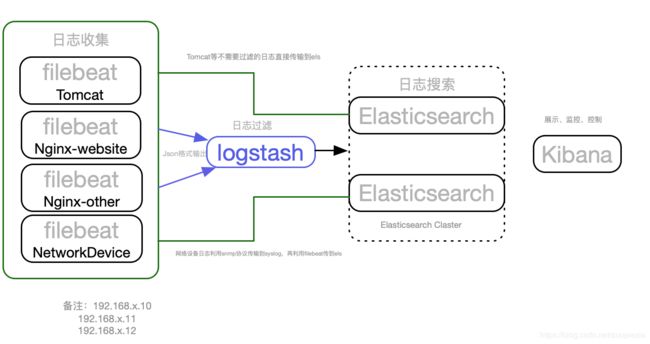ELK集群安装
#!/bin/bash
Top 图
##ELK 集群安装
master-node 192.168.x.29 :es,jdk,kibana
data-node1 192.168.x.35 :es,jdk,logstash
data-node2 192.168.x.38 :es,jdk版本信息
jdk 1.8
Elasticsearch-6.0.0
logstash-6.0.0
kibana-6.0.0
filebeat-6.0.01.修改hosts
master-node 节点安装ansible
yum install -y ansible
##设置无密码 到三台机器
ssh-keygen
设置hosts
cat <
[master]
192.168.x.29 hostname=es-master
[node]
192.168.x.35 hostname=es-node1
192.168.x.38 hostname=es-node2
[es:children]
master
node
END
测试ansible 安装
ansible es -m ping
##修改主机名
ansible es -m hostname -a 'name={{ hostname }}'
##修改/etc/hosts
ansible es -m shell -a "cat <> /etc/hosts
192.168.x.29 es-master
192.168.x.35 es-node1
192.168.x.38 es-node2" ##安装es 安装官方文档进行安装,这次安装的是6.4
#https://www.elastic.co/guide/en/elasticsearch/reference/6.4/rpm.html
ansible es -m shell -a "rpm --import https://artifacts.elastic.co/GPG-KEY-elasticsearch "
ansible es -m shell -a "yum install -y vim"
##创建一个文件
ansible es -m file -a "path=/etc/yum.repos.d/es.repo state=touch"
##es.repo 写出来
ansible es -m shell -a "
cat </etc/yum.repos.d/es.repo
[elasticsearch-6.x]
name=Elasticsearch repository for 6.x packages
baseurl=https://artifacts.elastic.co/packages/6.x/yum
gpgcheck=1
gpgkey=https://artifacts.elastic.co/GPG-KEY-elasticsearch
enabled=1
autorefresh=1
type=rpm-md
"
#安装java 下载java 版本1.8
ansible node -m copy -a 'src=/root/jdk-8u191-linux-x64.tar.gz dest=/root/'
ansible node -m shell -a 'tar -zxvf jdk-8u191-linux-x64.tar.gz -C /usr/local/'
ansible node -m shell -a 'mv /usr/local/jdk1.8.0_191 /usr/local/java'
cat < /etc/profile.d/java_env.sh
JAVA_HOME=/usr/local/java
JRE_HOME=/usr/local/java/jre
CLASS_PATH=.:\$JAVA_HOME/lib/dt.jar:\$JAVA_HOME/lib/tools.jar:\$JRE_HOME/lib
PATH=\$PATH:\$JAVA_HOME/bin:\$JRE_HOME/bin
export JAVA_HOME JRE_HOME CLASS_PATH PATH
END
ansible node -m copy -a 'src=/etc/profile.d/java_env.sh dest=/etc/profile.d/'
ansible es -m shell -a 'source /etc/profile.d/java_env.sh'
ansible es -m shell -a 'java -version'
#批量安装,直接安装yum太慢,建议先下载
ansible es -m yum -a 'state=present name=elasticsearch'
#批量删除
ansible es -m yum -a 'state=removed name=tree'
ansible es -m yum -a 'state=absent name=tree'
ansible es -m shell -a 'yum localinstall elasticsearch-6.4.2.rpm -y'##主节点配置如下
egrep -v '#|^$' /etc/elasticsearch/elasticsearch.yml
cluster.name: es-master
node.name: es-master
node.data: false
path.data: /var/lib/elasticsearch
path.logs: /var/log/elasticsearch
network.host: 0.0.0.0
http.port: 9200
discovery.zen.ping.unicast.hosts: ["192.168.x.29","192.168.x.25","192.168.x.38"]##两个节点配置如下:
##es-node1
cluster.name: es-master
node.name: es-node1
node.data: true
path.data: /var/lib/elasticsearch
path.logs: /var/log/elasticsearch
network.host: 0.0.0.0
http.port: 9200
discovery.zen.ping.unicast.hosts: ["192.168.x.29","192.168.x.25","192.168.x.38"]##es-node2
cluster.name: es-master
node.name: es-node2
node.data: true
path.data: /var/lib/elasticsearch
path.logs: /var/log/elasticsearch
network.host: 0.0.0.0
http.port: 9200
discovery.zen.ping.unicast.hosts: ["192.168.x.29","192.168.x.25","192.168.x.38"]
[root@es-node2 ~]# ##做个链接,这个链接得做,要不然启动报错
ln -s /usr/local/java/bin/java /usr/bin/[root@es-master bin]#
systemctl status elasticsearch
● elasticsearch.service - Elasticsearch
Loaded: loaded (/usr/lib/systemd/system/elasticsearch.service; disabled; vendor preset: disabled)
Active: failed (Result: exit-code) since Mon 2018-11-05 10:43:15 CST; 2min 11s ago
Docs: http://www.elastic.co
Process: 22318 ExecStart=/usr/share/elasticsearch/bin/elasticsearch -p ${PID_DIR}/elasticsearch.pid --quiet (code=exited, status=1/FAILURE)
Main PID: 22318 (code=exited, status=1/FAILURE)
Nov 05 10:43:15 es-master systemd[1]: Started Elasticsearch.
Nov 05 10:43:15 es-master systemd[1]: Starting Elasticsearch...
Nov 05 10:43:15 es-master elasticsearch[22318]: which: no java in (/usr/local/sbin:/usr/local/bin:/usr/sbin:/usr/bin)
Nov 05 10:43:15 es-master systemd[1]: elasticsearch.service: main process exited, code=exited, status=1/FAILURE
Nov 05 10:43:15 es-master systemd[1]: Unit elasticsearch.service entered failed state.
Nov 05 10:43:15 es-master systemd[1]: elasticsearch.service failed.
[root@es-master bin]# systemctl restart elasticsearch
[root@es-master bin]# systemctl status elasticsearch
systemctl restart elasticsearch###确认 elasticsearch 是否启动正常
###浏览器确认
http://192.168.x.29:9200/_cluster/state?pretty
http://192.168.x.29:9200/_cluster/health?pretty
###命令行确认
curl 'http://192.168.x.29:9200/_cluster/state?pretty'
curl 'http://192.168.x.29:9200/_cluster/health?pretty'
##安装kibana 在master 节点上执行
wget https://artifacts.elastic.co/downloads/kibana/kibana-6.4.2-x86_64.rpm
yum localinstall kibana-6.4.2-x86_64.rpm
[root@es-master ~]# egrep -v '#|^$' /etc/kibana/kibana.yml
server.port: 5601
server.host: "192.168.x.29"
elasticsearch.url: "http://192.168.x.29:9200"
logging.dest: /var/log/kibana.log##启动服务
touch /var/log/kibana.log; chmod 777 /var/log/kibana.log
systemctl start kibana && systemctl status kibana
ps aux |grep kibana
netstat -tunlp |grep 5601###登录web 192.168.x.29:5601 可以正常登录
###安装安装logstash es-node1 节点上安装
yum install -y logstash
##或者wget 6.4.2 版本的
##先配置logstash收集syslog日志
cat < /etc/logstash/conf.d/syslog.conf
input { # 定义日志源
syslog {
type => "system-syslog" # 定义类型
port => 10514 # 定义监听端口
}
}
output { # 定义日志输出
stdout {
codec => rubydebug # 将日志输出到当前的终端上显示
}
}
END
###测试配置是否正确,当输出有ok,是说明配置ok
cd /usr/share/logstash/bin/
./logstash --path.settings /etc/logstash/ -f /etc/logstash/conf.d/syslog.conf --config.test_and_exit
Sending Logstash logs to /var/log/logstash which is now configured via log4j2.properties
[2018-11-05T11:38:23,022][INFO ][logstash.setting.writabledirectory] Creating directory {:setting=>"path.queue", :path=>"/var/lib/logstash/queue"}
[2018-11-05T11:38:23,030][INFO ][logstash.setting.writabledirectory] Creating directory {:setting=>"path.dead_letter_queue", :path=>"/var/lib/logstash/dead_letter_queue"}
[2018-11-05T11:38:23,363][WARN ][logstash.config.source.multilocal] Ignoring the 'pipelines.yml' file because modules or command line options are specified
Configuration OK
[2018-11-05T11:38:25,387][INFO ][logstash.runner ] Using config.test_and_exit mode. Config Validation Result: OK. Exiting Logstash
[root@es-node1 bin]# #
# --path.settings 用于指定logstash的配置文件所在的目录
# -f 指定需要被检测的配置文件的路径
# --config.test_and_exit 指定检测完之后就退出,不然就会直接启动了
###配置服务器ip及监听端口 在es-node1 节点上 /etc/rsyslog.conf 最后修改配置文件
*.* @@192.168.x.35:10514
##重启服务
systemctl restart rsyslog
##指定配置文件,启动logstash
cd /usr/share/logstash/bin/
./logstash --path.settings /etc/logstash/ -f /etc/logstash/conf.d/syslog.conf
## 查看端口
netstat -lntp |grep 10514
tcp6 0 0 :::10514 :::* LISTEN 31956/java
udp 0 0 0.0.0.0:10514 0.0.0.0:* 31956/java ###下面正式配置 syslog.conf 中的文件
cat < /etc/logstash/conf.d/syslog.conf
input {
syslog {
type => "system-syslog"
port => 10514
}
}
output {
elasticsearch {
hosts => ["192.168.x.29:9200"] # 定义es服务器的ip
index => "system-syslog-%{+YYYY.MM}" # 定义索引
}
}
END ###再次检测是否有错误
cd /usr/share/logstash/bin
./logstash --path.settings /etc/logstash/ -f /etc/logstash/conf.d/syslog.conf --config.test_and_exit
Sending Logstashs logs to /var/log/logstash which is now configured via log4j2.properties
Configuration OK
[root@data-node1 /usr/share/logstash/bin]#
##修改logstash 监听地址
vim /etc/logstash/logstash.yml
http.host: "192.168.x.35"##设置log日志权限
chown logstash /var/log/logstash/logstash-plain.log
chown -R logstash /var/lib/logstash/
##启动服务,查看端口
systemctl start logstash
netstat -tunlp |grep 9600
tcp6 0 0 192.168.x.35:9600 :::* LISTEN 32032/java
netstat -tunlp |grep 10514
tcp6 0 0 :::10514 :::* LISTEN 32032/java
udp 0 0 0.0.0.0:10514 0.0.0.0:* 32032/java ###查看kibana 的log 日志
curl 'http://192.168.x.29:9200/_cat/indices?v‘
health status index uuid pri rep docs.count docs.deleted store.size pri.store.size
green open .kibana 7vzZONWtRFiw0ZlgaS_8dw 1 1 1 0 8kb 4kb
green open system-syslog-2018.11 Ok5T4Tf2SPy7xAo0qnmJ7w 5 1 14 0 224.7kb 112.3kb
###获取指定索引详细信息
curl -XGET '192.168.x.29:9200/system-syslog-2018.11?pretty'
###安装beats 轻量级日志采集服务器
##在es-node2 上安装
yum install -y filebeat
egrep -v '#|^$' /etc/filebeat/filebeat.yml
filebeat.inputs:
- type: log
paths:
- /var/log/messages
filebeat.config.modules:
path: ${path.config}/modules.d/*.yml
reload.enabled: false
setup.template.settings:
index.number_of_shards: 3
setup.kibana:
output.elasticsearch:
hosts: ["192.168.x.29:9200"]###启动服务器
systemctl start filebeat
curl '192.168.x.29:9200/_cat/indices?v'
[root@es-node2 filebeat]# curl '192.168.x.29:9200/_cat/indices?v'
health status index uuid pri rep docs.count docs.deleted store.size pri.store.size
green open filebeat-6.4.2-2018.11.05 wmMZX3jKTdK8xsTwKNw5_A 3 1 342 0 177.9kb 69.8kb
green open .kibana 7vzZONWtRFiw0ZlgaS_8dw 1 1 2 0 22kb 11kb
green open system-syslog-2018.11 Ok5T4Tf2SPy7xAo0qnmJ7w 5 1 20 0 328.9kb 168.6kb##在kibana 上进行配置
###在kibana 上安装nginx 进行转发 5601 端口
yum install nginx httpd -t
##修改nginx.conf 配置
cp /etc/nginx/nginx.conf{,.bk}
[root@es-master conf.d]# egrep -v '#|^$' /etc/nginx/nginx.conf
user nginx;
worker_processes auto;
error_log /var/log/nginx/error.log;
pid /run/nginx.pid;
include /usr/share/nginx/modules/*.conf;
events {
worker_connections 1024;
}
http {
log_format main '$remote_addr - $remote_user [$time_local] "$request" '
'$status $body_bytes_sent "$http_referer" '
'"$http_user_agent" "$http_x_forwarded_for"';
access_log /var/log/nginx/access.log main;
sendfile on;
tcp_nopush on;
tcp_nodelay on;
keepalive_timeout 65;
types_hash_max_size 2048;
include /etc/nginx/mime.types;
default_type application/octet-stream;
include /etc/nginx/conf.d/*.conf;
}###admin 的密码是xxxxxxxxxxxx
htpasswd -c /etc/nginx/passwd.db admin cat < /etc/nginx/conf.c/elk.conf
server {
listen 80;
server_name localhost; #当前主机名
auth_basic "Restricted Access";
auth_basic_user_file /etc/nginx/passwd.db; #登录验证
location / {
proxy_pass http://localhost:5601; #转发到kibana
proxy_http_version 1.1;
proxy_set_header Upgrade $http_upgrade;
proxy_set_header Connection 'upgrade';
proxy_set_header Host $host;
proxy_cache_bypass $http_upgrade;
}
}
END
nginx -t
##到目前为止elk 安装完成
